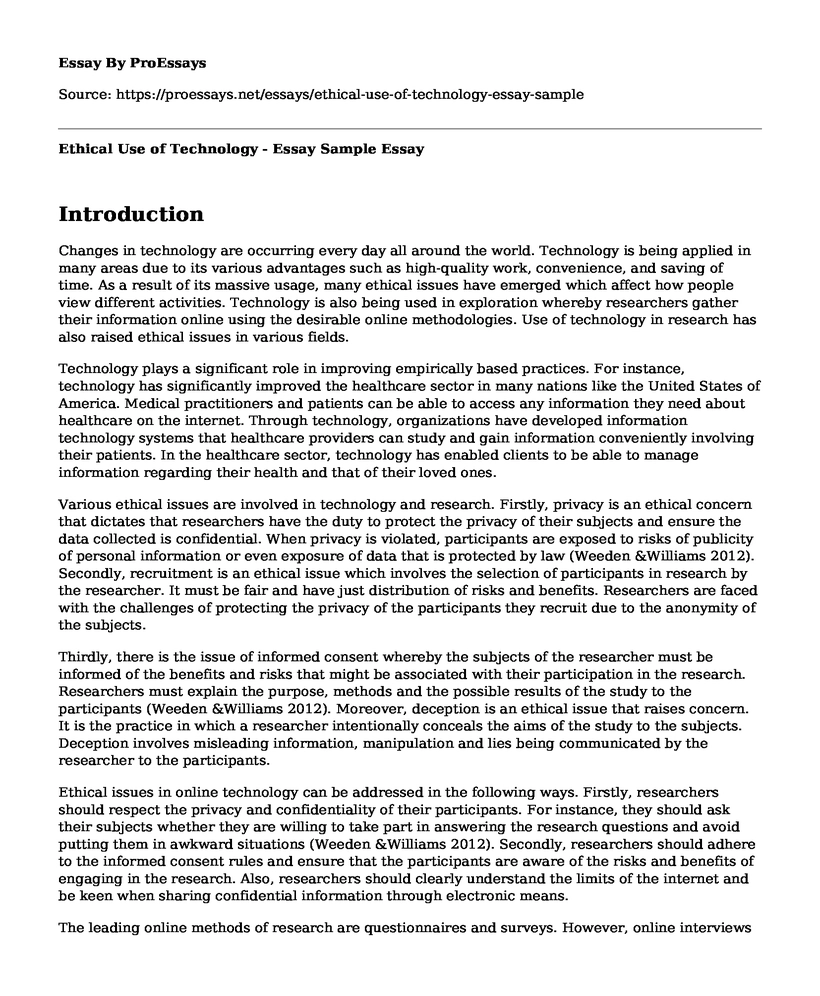Introduction
Changes in technology are occurring every day all around the world. Technology is being applied in many areas due to its various advantages such as high-quality work, convenience, and saving of time. As a result of its massive usage, many ethical issues have emerged which affect how people view different activities. Technology is also being used in exploration whereby researchers gather their information online using the desirable online methodologies. Use of technology in research has also raised ethical issues in various fields.
Technology plays a significant role in improving empirically based practices. For instance, technology has significantly improved the healthcare sector in many nations like the United States of America. Medical practitioners and patients can be able to access any information they need about healthcare on the internet. Through technology, organizations have developed information technology systems that healthcare providers can study and gain information conveniently involving their patients. In the healthcare sector, technology has enabled clients to be able to manage information regarding their health and that of their loved ones.
Various ethical issues are involved in technology and research. Firstly, privacy is an ethical concern that dictates that researchers have the duty to protect the privacy of their subjects and ensure the data collected is confidential. When privacy is violated, participants are exposed to risks of publicity of personal information or even exposure of data that is protected by law (Weeden &Williams 2012). Secondly, recruitment is an ethical issue which involves the selection of participants in research by the researcher. It must be fair and have just distribution of risks and benefits. Researchers are faced with the challenges of protecting the privacy of the participants they recruit due to the anonymity of the subjects.
Thirdly, there is the issue of informed consent whereby the subjects of the researcher must be informed of the benefits and risks that might be associated with their participation in the research. Researchers must explain the purpose, methods and the possible results of the study to the participants (Weeden &Williams 2012). Moreover, deception is an ethical issue that raises concern. It is the practice in which a researcher intentionally conceals the aims of the study to the subjects. Deception involves misleading information, manipulation and lies being communicated by the researcher to the participants.
Ethical issues in online technology can be addressed in the following ways. Firstly, researchers should respect the privacy and confidentiality of their participants. For instance, they should ask their subjects whether they are willing to take part in answering the research questions and avoid putting them in awkward situations (Weeden &Williams 2012). Secondly, researchers should adhere to the informed consent rules and ensure that the participants are aware of the risks and benefits of engaging in the research. Also, researchers should clearly understand the limits of the internet and be keen when sharing confidential information through electronic means.
The leading online methods of research are questionnaires and surveys. However, online interviews can also be used as a methodology in online research. It involves communication of the researcher with the participants through computers. Such interviews involve video calls, emails or instant messaging. The researchers gather information from the participants by asking questions and their perspectives towards the topics of study. The main importance or interviews is that it helps the researcher to understand the significance that participants assign to their lives and activities.
Several questions can be asked regarding technology. For instance, is technology allowing researchers to adhere to their ethical conducts or is it making them violate the ethical behaviors? Is technology outdoing the recognized human practices or enhancing them? Such questions can be hard to answer, but when researched expertly through the internet, one can gain knowledge that can aid in explaining them.
Conclusion
Technology has simplified several activities done by humans including research. Researchers can conduct their studies online using methods such as surveys and questionnaires. However, several ethical issues are involved, for instance, deception, informed consent rules and privacy of the participants. The researchers must ensure that the participants understand the goals, risks, benefits and intended outcomes of any online research before conducting it.
References
Weeden, M. R., & Williams, G. (2012). Ethics and online research methodology. Journal of Social Work Values and Ethics, 9(1), 40-51.
Cite this page
Ethical Use of Technology - Essay Sample. (2022, Dec 14). Retrieved from https://proessays.net/essays/ethical-use-of-technology-essay-sample
If you are the original author of this essay and no longer wish to have it published on the ProEssays website, please click below to request its removal:
- If Computers Can Understand Images the Same Way Human Brains Do Paper Example
- Personal Internet Use and Risk Management Essay Example
- Paper Example on Understanding Diffusion of Innovation Theory & Its Benefits
- AI in Sports: Impact on Commercial Recreation and Tourism - Essay Sample
- Technology & Energy: Historical Evolution & Social Impact - Essay Sample
- Green Innovations: Re-Usage, Recycling & Pollution Prevention - Essay Sample
- Fossil Fuels: Rising Demand & Climatic Change Impact - Research Paper







